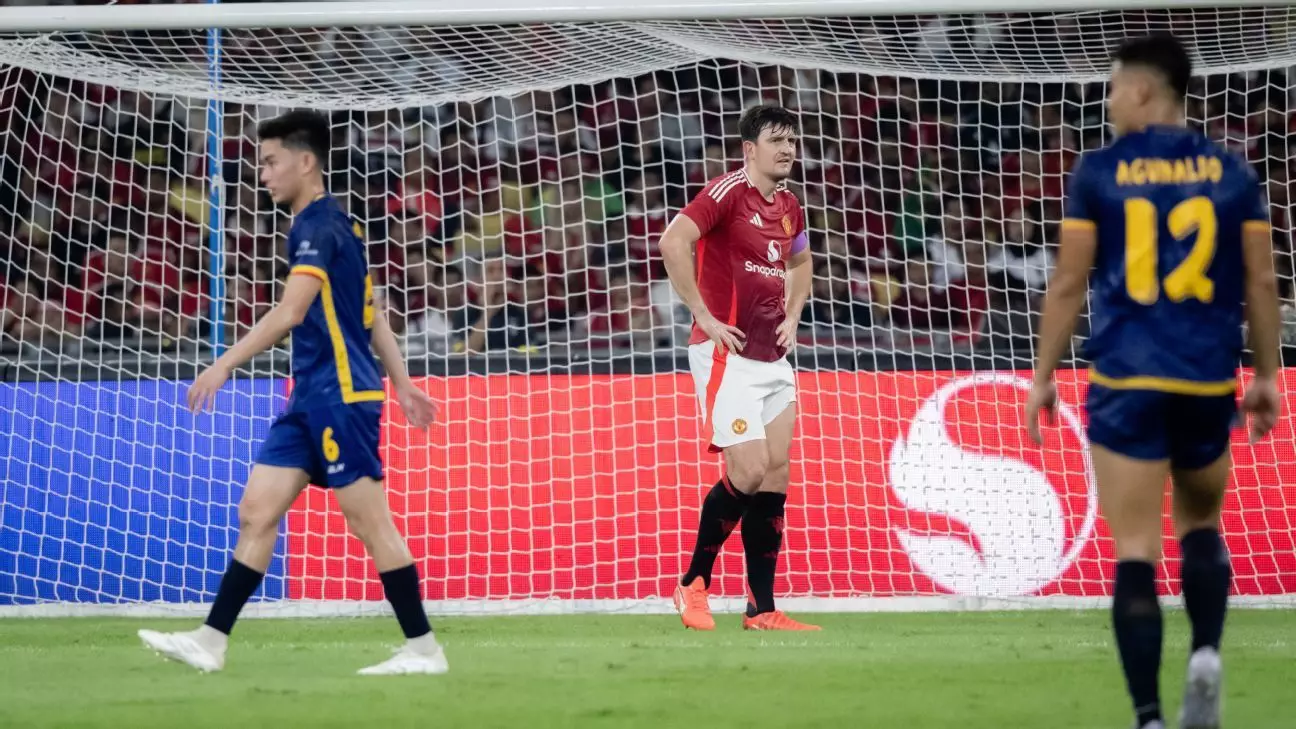Manchester United, once a powerhouse of English football, finds itself in a tumultuous state, struggling both on and off the pitch. Recent events during their tour in Malaysia have underscored the depth of dissatisfaction among fans and the ongoing struggles faced by the management and players. With a poorly received loss against the ASEAN All-Stars, the shadow of the club’s disastrous Premier League season continues to loom large, casting doubt on the future of a team that once basked in glory.
United’s summer friendly against the ASEAN All-Stars ended in a disheartening 1-0 defeat, culminating in a cacophony of boos from fans who had traveled to the Bukit Jalil National Stadium. This was not just another exhibition match; it served as a somber reminder of the club’s failings highlighted by a 15th-place finish in the Premier League—its worst-ever ranking. After a lackluster domestic campaign, the energy surrounding the club desperately needs a revival, and this embarrassment only adds to the cloud of uncertainty hovering over Old Trafford.
Managerial Accountability
Ruben Amorim, who was brought in to restore some semblance of stability, expressed heartfelt apologies following the match, stating that he feels a personal responsibility for the team’s poor performance. His comments reflect an awareness of the mounting pressure, but they only seem to stir the ire of a fanbase that demanded more from their team. When one considers the expectations for a club with such a decorated history, Amorim’s admission may appear to be little more than an empty platitude—fans want action, not excuses.
The palpable frustration from supporters hints at an urgent need for change, hoping that their wrath can spark a transformation. Amorim, however, seems to believe that such discontent might bring about a necessary jolt for players who have, until now, been complacent. Every loss has intensified the scrutiny, yet the question remains: Will booing from the stands serve as a catalyst for improvement, or are the problems too ingrained to remedy with mere fan influence?
Player Performances Under Scrutiny
The team that took the field against the ASEAN All-Stars saw a blend of key figures like André Onana, Harry Maguire, and Rasmus Højlund mixing with younger talents, yet they failed to gel into a cohesive unit capable of overcoming even a makeshift squad. The introduction of notable players such as Bruno Fernandes and Alejandro Garnacho didn’t yield the anticipated resurgence, indicating deeper issues affecting the squad’s overall morale and tactical coherence.
Amorim’s route to rebuilding the team requires clarity regarding his player selections and game strategy. The lack of impact made by seasoned players suggests that they too are grappling with confidence issues, a far cry from the decisive and formidable performances that fans have come to expect. Even Amorim recognizes the urgent need for improvement, proclaiming that the squad must foster a winning attitude, contrasting sharply with their current output.
Forward Planning Amidst Chaos
While fans remain vocal about their discontent, Manchester United’s executive team is reportedly charting a course for recovery. CEO Omar Berrada emphasized that the club has been proactive in its planning, awaiting the summer transfer window with much anticipation. Arguably, this could be the turning point for United, as they look to address key areas in need of investment. However, fans may be skeptical about how many times the club has promised change while continuing to deliver mediocrity on the pitch.
The speculation surrounding the club’s potential acquisition of a talent like Matheus Cunha from Wolverhampton Wanderers reflects the management’s intent to bring in fresh energy. Still, without substantive improvements on the field in the near term, a new player alone cannot bridge the vast chasm of disappointment experienced by loyal supporters.
The upcoming match against Hong Kong’s national team serves as another opportunity for United; however, ‘almost’ isn’t good enough anymore. The pressure is mounting for Amorim to instill confidence and a winning mentality within his squad. Fans need not just a signal of intent but a tangible shift in results to restore their faith in what was once the pride of English football.

